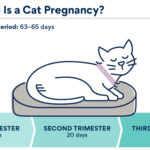Watermelon, a juicy and hydrating fruit, is a summertime favorite for many humans. If you’re enjoying a slice, you might wonder, “Can Cats Eat Watermelon too?” The simple answer is yes, cats can eat watermelon in moderation. However, it’s not as straightforward as offering them a piece and calling it a day. As a dedicated content creator for solcat.net, let’s dive into whether watermelon is a safe and suitable treat for your feline companion, ensuring we provide you with expert-level information.
Is Watermelon Safe for Cats? Understanding the Basics
Generally, watermelon is considered safe for healthy adult cats and kittens when given in small amounts. It’s non-toxic and doesn’t contain compounds that are inherently poisonous to felines. However, just because it’s safe doesn’t automatically make it a healthy or beneficial snack for them.
Cats are obligate carnivores, meaning their digestive systems are primarily designed to process and derive nutrients from meat. Their nutritional needs are vastly different from ours. While we can reap numerous health benefits from fruits and vegetables, cats are not built to do the same. Their bodies are optimized for a diet rich in protein and specific nutrients found in animal tissues.
 A slice of watermelon with seeds
A slice of watermelon with seeds
While watermelon is mostly water (hence its name!), it does contain some vitamins and minerals like potassium and vitamin C. However, the nutritional benefits for cats are minimal at best. The primary draw for cats when it comes to watermelon is likely its high water content, which can contribute to hydration, especially on warm days.
Potential Risks of Feeding Watermelon to Cats
Despite being non-toxic, watermelon isn’t without potential downsides for cats, especially if not served correctly or if your cat has underlying health conditions.
- Sugar Content: Watermelon contains natural sugars. While not as high as some other fruits, these sugars can still be problematic for cats, particularly those with diabetes or who are overweight. High sugar intake can disrupt blood sugar levels in diabetic cats and contribute to weight gain or worsen obesity.
- Digestive Upset: Cats’ digestive systems aren’t designed to process large amounts of plant-based foods or sugars. Even in healthy cats, too much watermelon can lead to gastrointestinal issues like vomiting or diarrhea. This is because their bodies might struggle to break down and absorb the carbohydrates and sugars present in the fruit.
- Seeds and Rind: Definite No-Nos: This is crucial: never give your cat watermelon seeds or rind. Watermelon seeds contain trace amounts of cyanide, which, while generally not harmful in tiny quantities, can be toxic in larger amounts. More importantly, both seeds and the tough rind pose significant choking hazards. The rind is also very difficult for cats to digest and can cause digestive blockages.
How to Safely Offer Watermelon to Your Cat
If you decide to offer your cat watermelon, moderation and proper preparation are key:
- Small Portions Only: Think of watermelon as an occasional treat, not a regular part of their diet. A bite-sized cube (about 1-inch square or less), cut into even smaller pieces, is more than sufficient for a serving.
- Seedless and Rindless: Always remove all seeds and rind before offering watermelon to your cat. Only offer the pink flesh of the fruit. Seedless watermelon varieties are ideal to minimize seed-related risks.
- Monitor for Reactions: After introducing watermelon, observe your cat for any signs of digestive upset like vomiting, diarrhea, or loss of appetite. If these occur, discontinue giving watermelon.
- Consider Your Cat’s Health: If your cat has diabetes, is overweight, or has a sensitive stomach, it’s best to avoid watermelon altogether. Consult your veterinarian before offering watermelon to cats with pre-existing health conditions.
Do Cats Even Enjoy Watermelon? Taste and Preference
Interestingly, most cats don’t naturally crave watermelon. Cats lack the taste receptors to detect sweetness in the same way humans do. Therefore, it’s unlikely they are drawn to watermelon for its sugary taste.
However, some cats might be attracted to watermelon’s moisture content and its texture. On a hot day, the cool, watery flesh might be appealing. It’s also possible that a cat’s curiosity or desire to share what their owner is eating might lead them to try watermelon.
Don’t be surprised if your cat shows no interest in watermelon. Their natural instincts lean towards savory, meaty flavors, not sweet fruits.
What to Do If Your Cat Eats Watermelon
If your healthy cat has only eaten a small, seedless, and rindless piece of watermelon, there’s usually no cause for alarm. Keep an eye on them for any signs of mild digestive upset.
However, if your cat has consumed a larger amount of watermelon, especially if they have health issues, or if they’ve eaten seeds or rind, it’s wise to contact your veterinarian for advice. They can provide guidance based on your cat’s specific situation and health history.
Conclusion: Watermelon as an Occasional Treat, Not a Dietary Staple
In conclusion, can cats eat watermelon? Yes, in very small, properly prepared amounts, watermelon is generally safe for healthy cats. However, it offers minimal nutritional benefits and carries potential risks if not given in moderation or if seeds and rind are ingested.
Watermelon should never be considered a significant part of a cat’s diet. Their primary nutritional needs should always be met by a high-quality, meat-based cat food. If your cat shows interest in watermelon and tolerates it well in small quantities, it can be an occasional refreshing treat. But always prioritize their health and safety by serving it correctly and being mindful of any potential adverse reactions. And when in doubt, always consult with your veterinarian.

